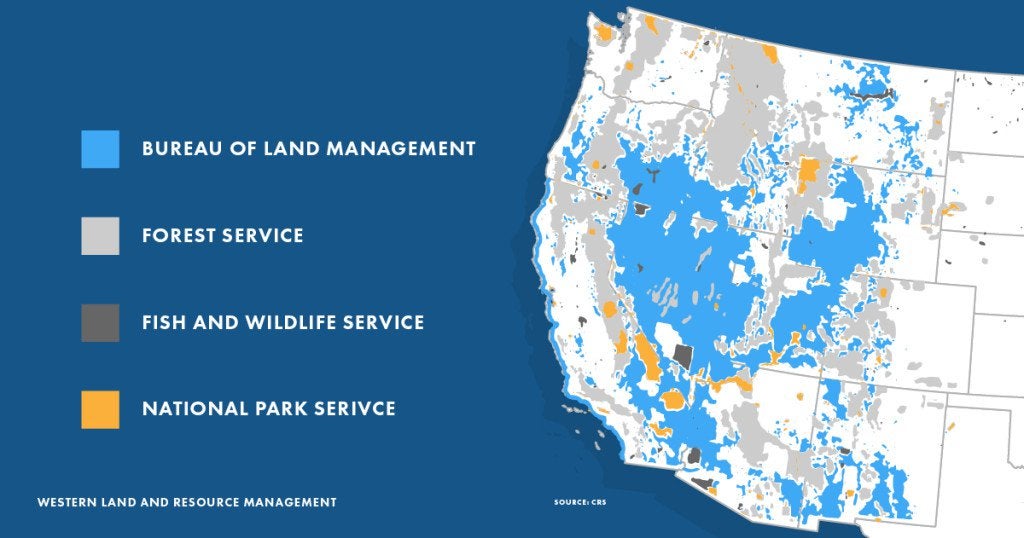The American West is a land of wonder and opportunity. The West is a destination for those seeking the serenity of the outdoors as well as home to many families that work the land, whether ranching, mining minerals or developing renewable or fossil energy. As in so many other parts of our economy, the federal government's role in managing these resources is overreaching, priorities are misplaced, and it is harming people in the region.
People in the West feel the impact of federal decision-making more acutely than those in the rest of the nation. Of the 635 million acres owned and managed by the federal government, 582 million acres — 90 percent — are in the West, including Alaska. In the 11 most Western states, excluding Alaska and Hawaii, the federal government controls nearly half the land (see map below). For instance, over 80 percent of Nevada is federally-owned. By contrast, the federal government owns 4 percent of all the remaining 37 states further east.
Increasingly, the federal government does not treat Western states, local governments, tribes and land owners as equal partners. Under the Obama Administration, federal land management is characterized by restrictive regulations, more land use constraints, more land acquisition, more "analysis paralysis," and more "sue and settle"-driven policies.
This relentless overregulation has undermined the trust between Western communities and the federal government. It must be restored. Washington, DC needs to acknowledge that people who live on the land in the West are the best stewards of the land. Federal holdings should be valuable recreational and economic assets, not a liability to economic freedom and growth.
I will fix the relationship between the federal government and the West. I propose four principles, backed up by specific policies, to rebuild trust.
Full and Equal Partnership
Western communities need an equal partner in the federal government. Washington, DC's decisions from afar are too often based on the baseline assumption that states and tribes care less about the environment than federal officials. That is false. Decisions relating to lands, rivers and lakes, and wildlife affect local people's livelihoods, the places their families camp or hunt and the water they drink. No one has a more vested interest in stewardship of our natural heritage than those that coexist with it.
For instance, as governor, I secured a full and equal partnership with the federal government in restoring the Everglades. It is the world's largest intergovernmental watershed restoration effort and the most ambitious ecosystem restoration effort in history. I brought stakeholders, businesses and conservationists together with state and federal agencies, forging a fair and equal coalition to ensure the Everglades would be conserved for generations to come.
In order to fix this relationship I will:
- Support moving the Department of the Interior headquarters from Washington, DC to a location closer to the lands it manages and the people it most affects, such as Denver, Salt Lake City or Reno. Historically, presidents export a Secretary of the Interior from the West to Washington, DC. It is time to import the Department from Washington, DC to the West;
- Direct agencies, consistent with law, to give deference to states to determine what land uses are sustainable and most compatible for citizens who live in a particular area;
- Practice dynamic and partnership-based decision-making starting with convening a meeting of Westerners (e.g., Western Governors, tribal leaders and other elected officials) to agree on a better framework for cooperative decision-making including, for instance, having a more inclusive process for establishing National Monuments which can lock up land from multiple uses; and
- Adopt "states-first" wildlife conservation policies that provide more deference to state plans for protecting and restoring species' populations such as the greater sage grouse.
Take Better Care of What We Have
The federal government owns about half of the west, yet it continues to acquire more land. In some cases these acquisitions make sense, such as inholdings or to promote recreational access, but in other cases they erode local tax bases and constrain growth.
Washington, DC needs to acquire less and take better care of what it already owns. Too much of the government's property is a mess and our lands are sick. For instance, the National Park Service turns 100 years old in 2016, but we have a maintenance backlog in our national parks of $11.5 billion. These are our national treasures, but over a third of our national parks' trails are in poor condition, over two dozen bridges are "structurally deficient" and 90 percent of the national parks paved roads are in "fair" or "poor" condition.
Washington, DC needs to acquire less and take better care of what it already owns.
Worse, a lack of active management of our forests and rangeland has led to deadly wildfires that are growing in number, size and intensity. More than nine million acres of forests and rangeland were affected by wildfires this year, an area the size of New Jersey and Connecticut combined. Forests and rangeland are thick with fuel. This risk can be reduced by conducting prescribed burns, more actively managing invasive plants, removing dead wood and harvesting timber.
In order to rebalance our priorities, as president I will:
- Back the temporary modification of the Land and Water Conservation Fund to better consolidate and maintain federal assets by:
- Providing our crown jewels — the national parks — with a 100th anniversary gift by supporting the redirection of a portion of acquisition funds to reduce the backlog of maintenance projects in our national parks;
- Targeting federal acquisition funds at inholdings and enhancement of existing lands and outdoor recreation opportunities; and
- Supporting the permanent reauthorization of the Land and Water Conservation Fund to provide greater certainty of funding for states; and
- Convene the nation's top experts on forest health to develop a new national wildfire policy and direct my cabinet to expedite the review of activities that would decrease wildfire risk.
Shared Use of Resources
The Obama Administration has increasingly attempted to grab state authority and constrain the acceptable uses of federal lands. This needs to be reversed. We can conserve our natural resources and create economic growth while avoiding the pitfalls of federal bureaucracy.
When it comes to the West, the federal government needs to demonstrate extra sensitivity to the decisions that can block economic opportunity for people whose livelihood is tied to the land. Onerous and overreaching rule-making, "paralysis by analysis" and "sue and settle" are all methods use to strangle multiple use projects, such as water infrastructure, grazing, timber, mining, renewable and fossil energy development and outdoor recreation. The overreaching Waters of the United States rule, for instance, has created great uncertainty among those families that rely on the land for their livelihood. The rule, for example, places up to 99 percent of Montana's land under the Environmental Protection Agency's jurisdiction.
When it comes to the West, the federal government needs to demonstrate extra sensitivity to the decisions that can block economic opportunity for people whose livelihood is tied to the land.
Even when Washington, DC does have clear authority to regulate, it is overbearing. Minerals and metals mined from Western lands are necessary for making computers, cell phones and structural steel. But an overly burdensome federal permitting process means a new mine takes seven to ten years before development can begin. That alone moves responsible mining operations to other parts of the world. Federal bureaucracy should not be denying Westerners jobs.
To help reinvigorate the West I will:
- Reaffirm western water rights by protecting against federal encroachment of surface and groundwater resources and stopping the Waters of the United States rule in its tracks;
- Expedite funding, studies and permitting for water infrastructure, especially water storage projects, as one way to address historic drought conditions; and
- Support a "two is enough" permitting policy whereby projects on federal lands requiring federal approval must be permitted or rejected within two years unless there are unusual circumstances. (This expands the scope of a previously announced regulatory reform proposal.)
Sportsmen and Outdoor Recreation Access
Americans should be encouraged, not discouraged, to fish, hike, hunt, camp and recreate on Federal lands. Yet, millions of acres of public land in the West are inaccessible to the public due to historic checkerboard land ownership patterns and inadequate points of entry. Importantly, lack of access to lands is a primary reason that hunters stop participating in this traditional sport.
I understand this. As the governor of Florida, I instituted a "no net loss" of sportsmen's access. I also signed a law ensuring Florida citizens had the right to carry firearms for lawful purposes while in national forests and state parks.
To continue to encourage families to seek out and enjoy outdoor activities, as president I will:
- Establish a national goal of "no net loss" of sportsmen's access, as I did in Florida; and
- Support a set-aside in the Land and Water Conservation Fund for funding easements, acquisitions or other projects that provide access for hunting, angling and other recreational activities on landlocked federal lands.
A New Relationship with the West
Conservation implies that people can actually access and responsibly use our land and water, but this administration has consistently made more resources off-limits to human beings. They are not listening to Western communities and the individuals who know Western lands best. As president, I will fix that relationship and propose policies that will show greater respect for local values and needs. I will increase, rather than suppress, opportunity for Western families.
Related Images
Jeb Bush, Jeb Bush Campaign Press Release - Western Land and Resource Management Online by Gerhard Peters and John T. Woolley, The American Presidency Project https://www.presidency.ucsb.edu/node/312897

